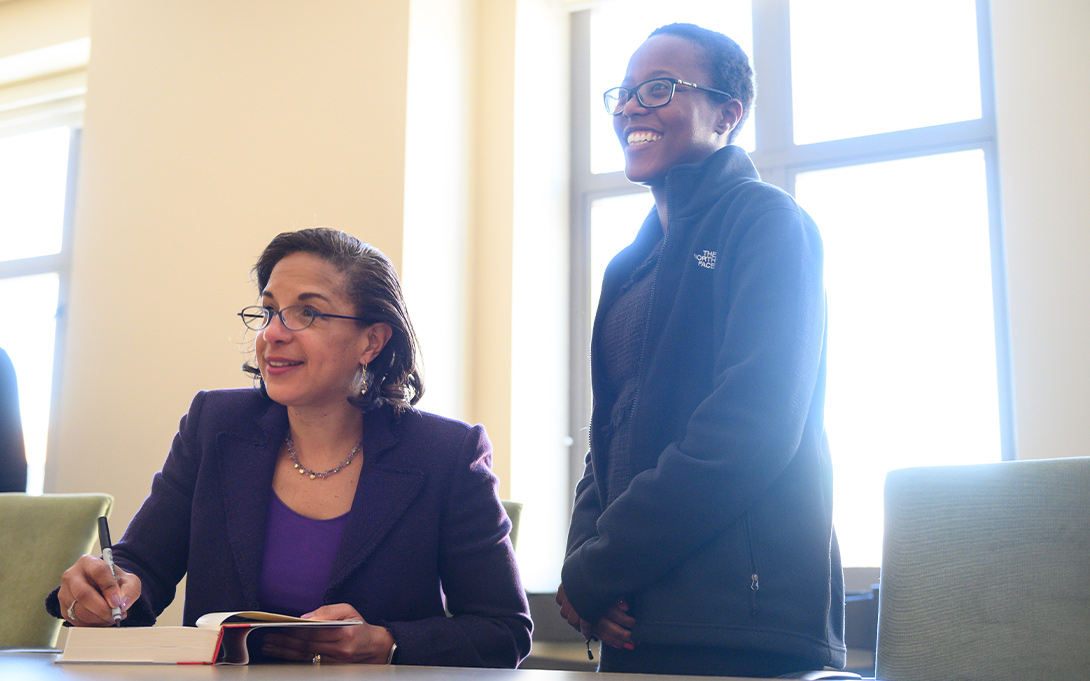
Following her public event at the Ford School this past Monday, Martin Luther King Jr. Day, Ambassador Susan Rice sat down with 20 Ford School students to discuss her career and leadership experiences working for the U.S. government. Students from the Ford School’s identity-based student organizations - Global Fordies, Out in Public, Students of Color in Public Policy, and Women and Gender in Public Policy - asked questions on how to succeed in the federal workspace as a member of a minority identity group.
Key themes of the discussion, hosted by dean Michael Barr, included recognizing the value of critical feedback and the wisdom of mentors, being as prepared as possible, knowing one’s self-worth, and empowering teams to advance a mission by valuing their contributions and recognizing their need to put family first at important moments.
In her earlier public remarks, Rice shared a story to illustrate the “tough love” she received early in her career from a Congressional colleague and mentor. When he told her “you are going to fail in this job if you don't dramatically change course,” she was surprised, but listened carefully, asked questions, and ultimately took his advice.
“I think quite honestly, if he had not intervened and told me the hard truth, giving me that tough love, I probably would not have been able to do the jobs that I was asked to do subsequently. I probably would not have been asked,” said Rice. In the student session, she elaborated on that anecdote, saying “there is no shame in failure as long as you learn from it.” Her mentor’s advice identified a blind spot in her team leadership, and she took the time to reflect, learn, and improve.
As the youngest person (at age 32) ever to become an Assistant Secretary of State at the State Department, Rice also stressed the importance of education, hard work, and preparation to demonstrate contributions to a team. In her experience, being “maximally prepared” - bringing content knowledge, communication skills, and social awareness to policy discussions - is vital to assessing a situation and gaining support for a position. Capable and qualified as a young black woman in an environment dominated by older white men, Rice was undeterred by detractors, and encouraged students to be confident in the value they bring.
When asked how to effectively balance between staying true to one’s self and navigating a political professional world, Rice said, “I am never not who I am. But I can be diplomatic when I want to be.” In challenging circumstances, Rice said she falls back on her father’s advice on defining self-worth in the face of racism and bigotry: “If my being black is going to be a problem, it will be a problem for somebody else, not for me. In other words, I have to know who I am and if they don’t think I belong, that is their problem.”
"One thing that stuck with me after our small group discussion with Ambassador Rice was how the words you use really matter,” said J’Taime Lyons (MPP/MBA ‘22). “I appreciated her reflections on how not only her skills, but also her temperament and confidence, allowed her to be successful in diplomacy as a black woman.”
Tying her core themes together, Rice concluded by emphasizing the importance of recognizing and encouraging talent on a team, and focusing on the larger mission of the enterprise. She also stressed being a leader who makes it possible to put family first. Using examples from her own life, she shared how vital it is to have an established culture of support, in which team members have each others’ backs.
“Leadership is a team sport and that means you have to inspire people to want to join together and join you in a common cause,” Rice said. “To achieve that, they have to feel they are bettered, and that their input is important. The glue of a team is mutual respect, but it’s also caring. I would not shy from using the term love.”
-Story by Chadd Dowding, MPP '21